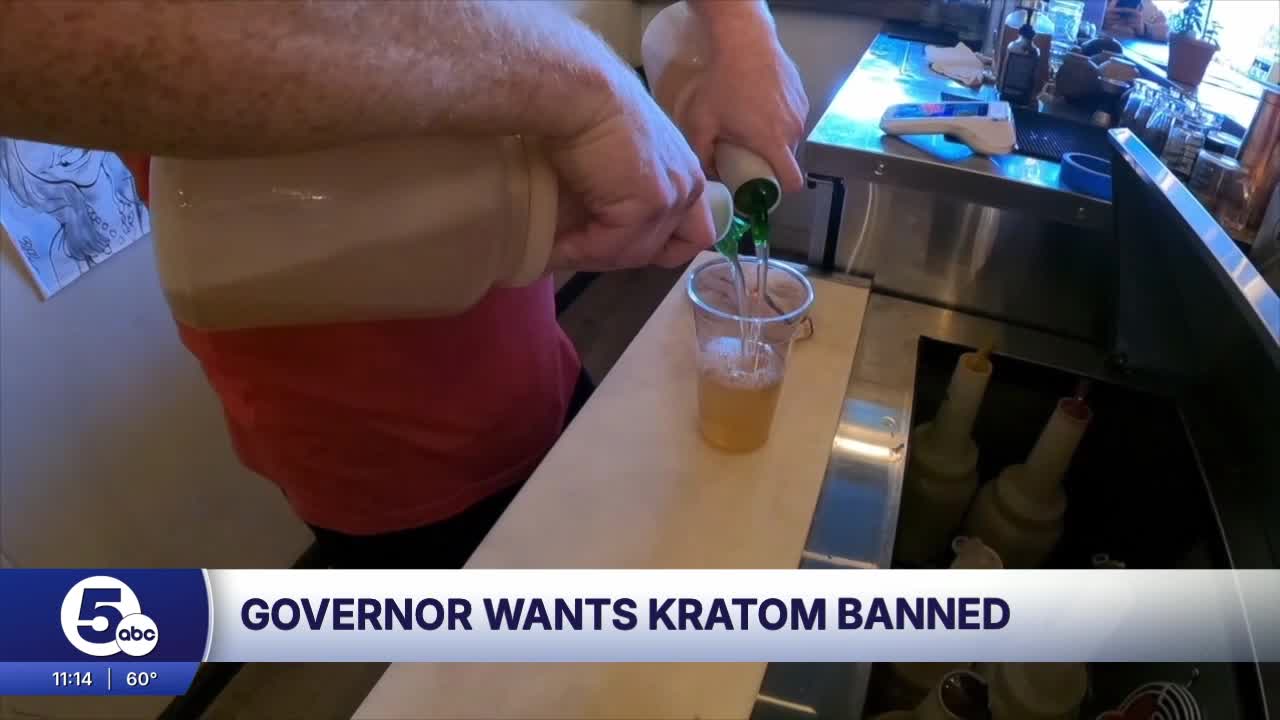CLEVELAND — If you didn't know what kratom is, get ready, because it's becoming quite the hot topic amongst state leaders.
On Tuesday, Gov. Mike DeWine called on the Ohio Board of Pharmacy to immediately designate all natural and synthetic kratom compounds as illegal drugs.
Kratom, a plant native to Southeast Asia, is not approved by the U.S. Food and Drug Administration (FDA) for consumption or medical use.
According to preliminary data from the Ohio Department of Health, kratom was found to be the cause of death in more than 200 unintentional overdose deaths in Ohio from 2019 to 2024.
“These modified kratom products, sold online and in stores, are essentially legal, over-the-counter opiates that anyone – including kids – can buy with just a few bucks,” said Governor DeWine. “There is no accepted medical use for kratom in Ohio, and it is an imminent public health risk."
Michael Young, a partner at Sacred Waters Kava Bar, told me he was surprised by the governor's demand.
The Sacred Waters Kava Bar has been open since May 2022, providing alternatives to alcohol, one of which is kratom.
"One of the things that is important is that what we serve is natural kratom," he said. "There are some synthetic or semi-synthetic kratom products out there that I wouldn't suggest people use. The gas station stuff, I wouldn't even touch it. At some smoke shops, I wouldn't touch it. However, the leaf itself is, in my opinion, very safe."
While thrown off by the governor's request to ban natural kratom, he understands the concern surrounding synthetic kratom.
"There's a product out there called 7-OH. It stands for seven hydroxy. I would urge people to stay away from that. That is like a semi-synthetic form of kratom where they extract one of the alkaloids in kratom and press it down to either a liquid or a pill. That's extremely strong for somebody that's never had that before. For them to get into that, it would be horrible. I think that's where DeWine got his idea to ban it. It was from that product specifically so I just tell people out there not to mess with that," Young said.
He told me he's seen social media ads for it and has even seen it in person at gas stations.
"It's amazing to me that people are trying to profit off of a different type of morphine or heroin, but kratom itself in its natural form is nothing like that," Young said.
And again, the Kava Bar said all of its kratom is natural, which means a small drink there contains 3.5 grams of kratom.
Regardless of the dosage, though, Rep. Anita Somani (D-Dublin) said there's not enough research available about the substance.
Somani is not only a state leader, but she's also a practicing OBGYN.
"I think the biggest difference between kratom and some of the other medications that we've seen is the side effects of it are very dose dependent. At low doses, it has a stimulant effect. Somebody who maybe had a rough night and needs a pick me up like a cup of coffee, at a low dose, it's gonna act like a stimulant," Somani said.
However, in large doses, Somani explained how kratom can be more of an opioid.
"It's been used for self-medication for chronic pain. Somebody who's going through heroin withdrawal, somebody who's going through narcotic withdrawal, maybe would take kratom as a way to calm those withdrawal side effects," Somani said.
RELATED: Recovering addicts warn of kratom
Somani told me high doses of kratom can lead to hallucinations, causing users to become violent or hostile.
I asked Somani what dosages would be considered safe and unsafe, but due to the lack of available information on the substance, she said she's not sure.
"I think that's something that maybe requires or should be more regulated," Somani said, though.
She fears if kratom is made illegal and causes people to look to the black market for it, it'll result in more deaths, as it could be laced.
Two bills have been recently introduced in each of the state legislative chambers that aimed to regulate kratom, but neither was successful.
While there is currently no pending legislation dealing with the regulation or research of kratom, Somani said it's something she's interested in drafting, hoping thatthe third time's a charm.
Young is all for research and regulation, telling me both are important.
"Research is the biggest thing. I think that's what's lacking with kratom. Even research done by the FDA is either incomplete or biased, so research is very important. Legislation is important, and that just takes time," Young said.
The Ohio Board of Pharmacy scheduled a special meeting on Wednesday to consider the request for a ban, but it was canceled. A reason why is not listed on its website.
"Governor DeWine made the right decision to kind of step back from their plan and, you know, learn a little bit more about it," Young said.
Hypothetically, if the prohibition on kratom went into effect in Ohio, Young said the Kava Bar would remain open, as kratom is not the only product they sell.
"We sell all different types of ethnobotanical teas from around the world that have psychoactive properties, calming properties or stimulating properties. We have other alternatives. Kratom is not the only thing that we sell, but it is a big thing. I would never shut down just because of that. We would find something else to do with the business, but it would definitely change it," Young said.
If kratom were to ever become illegal in Ohio, it would be the first state in the U.S. to categorize all current and future natural and synthetic kratom compounds as Schedule I drugs. All establishments selling kratom products in Ohio would be required to remove the items from their shelves.
We'll continue to follow through.





